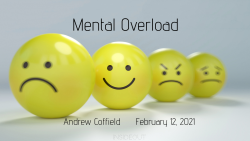Mental Overload

As I stood in line at what is widely considered to be the go-to sentimental gift store, also known as Things Remembered, ready to purchase what would be the first Christmas gift I would ever give to my wife, it was evident to those standing around me that something was off. I’ve never been one who’s great at hiding their emotions, and that fact was on full display as I stood there listening to Michael Buble serenade everyone through the overhead speakers with a brand new version of Jingle Bells.
What was my problem? Well, let’s just say it was three days before Christmas, and I had yet to buy any gifts. Go ahead and say it, because we know you’re thinking it, “What a typical guy thing to do!” As I finally reached the counter and told the store employee how I’d like the date of our anniversary engraved on the ornament I had picked out, my hands were sweaty as I was nervous they would tell me my order wouldn’t be done in time for December 25th. Gratefully, they were able to engrave the ornament expediently, and I picked it up later that day.
Fast forward to Christmas day and my wife is now opening this gift, and my eyes are fixed on her to await what I hoped to be a joyous reaction after she was able to get through my failed attempt at wrapping a box. Everything seemed to be going great, a bright smile was on her face, the angels were singing in the back of my head, “Hallelujah! Hallelujah!” That was all until she looked at the engraving on the ornament, and noticed that the date of our anniversary was incorrect. Epic fail.
If dictionaries recorded video moments that could be shown next to words- a video of that occurrence would show next to the word fail. I had a mental error, a lapse of judgment, one that occurred due to everything I was feeling while standing in that line. Mental errors are no fun, but they reveal that when our mental health is not in check, we run the risk of making decisions that we will at some point regret.
The days of pretending that Christians, in particular Apostolic Pentecostals, are exempt from suffering from mental health problems are over. Well, at least those days should be over. While there are plenty of areas within our post-modern society that have gone in a backward direction over the last several years, one area where we’ve darted forward is in talking about mental health. For several generations, if one classified themselves as a Christian and mentioned anything somewhat related to the subject of psychology, there was a strong likelihood their words could bring about backlash. It was once assumed in many faith circles that if you are a Christ-follower, you have the capacity to live above potential psychological disturbances. Nevertheless, we are better now for realizing that our faith, while ever so important, does not eliminate our mind from fighting both internal and external conflicts. As long as we carry around this temporary garment called flesh, we will need to war for sound mental health on a continual basis.
It is widely believed amongst researchers and intellectuals alike that the psychological damage the current Covid-19 pandemic is causing will far outweigh the physical damage that’s already been done. That sounds a little outrageous at first glance considering how many lives have been lost over the last year. Hundreds of thousands of people alone in the United States have perished, and that number continues to grow daily. Even so, what is oftentimes harder to initially show on a statistical report is the overall effect a pandemic is having on people’s mental health. Right now you can travel on over to Google and search for the number of positive Covid-19 cases worldwide, but what you can’t search for is the number of depression or suicide cases that have directly resulted from this pandemic. That is because longitudinal studies (studies done over the course of a longer period of time) will have to be completed to reveal just how deeply this pandemic has influenced people’s psychological balance.
So the question is, why is this pandemic having such a grave impact on our mental health? The answer is actually a lot simpler than you’d probably imagine. Everything revolves around a six-letter word that we all try to have very little of in our lives. That word is stress. Prior to 2020 most teenagers were primarily stressed about turning in assignments on time or merely completing them to begin with. Friendships were also a leading cause for stress, as most of us have that one friend who freaks out about anything and everything. Then you have the royal flush of stress variables, none other than worrying about one’s appearance.
A few years ago when I was in a school counseling internship at a suburban middle school, these three stress factors were clear to see, as students usually get the most stressed out about what they put the most effort into. Sadly, that stress creates a self-imposed pressure that will oftentimes lead to increased anxiety, fear, and depression if one doesn’t live up to such lofty standards they set for themselves. To go a little further, students around the country are busier than ever before, which adds additional stress and pressure when you are required to juggle school, family, friends, faith, extracurricular activities, etc. Some researchers estimate teens are busier and therefore more stressed out than their parents or grandparents are or ever were in their occupational careers. That right there is an issue and it explains why when I was in my internship, the high school principal stated during a district-wide meeting that nearly 40% of all students in his school were seeing a therapist on a regular basis.
But that was then and this is now, you may be thinking. That’s exactly what the problem is. As a teenager, you were probably already stressed out before this pandemic started, and now it has just gotten worse. Think of having to carry three heavy books in your hands while running to a class and then someone adds three additional heavy books to your load. That’s a small glimpse of what you or other teenagers are probably dealing with concerning stress right now. Except, this time the stress has been created through the changing of normalcy. The way our brain works is that it thrives when we have a routine, or everything in our life stays the same. Change triggers various hormones in our nervous system that causes us to become stressed.
Furthermore, change creates even more stress when its consequences directly influence what matters most to us or what we put the most effort into. Education, friendships, and self-image. While that shortlist doesn’t include everything that you’re focused on, all three of those elements in our life have been altered this year. So if you’ve experienced anxiety, fear, depression, or other psychological disturbances, please don’t beat yourself up. You’re not alone, chances are the majority of your peers have had similar problems.
All of this considered, as Christ-followers, we have the power to take authority over all the stress we’re feeling in our lives. Paul tells his son in the gospel in 2 Timothy 1:7 (NKJV) that, “…God has not given us a spirit of fear, but of power and of love and of a sound mind..” He spoke these words to Timothy because it was evident that his son in the gospel was timid at times, and stressed out over the great responsibility he had upon him to oversee God’s work in Ephesus. Fear doesn’t come from the Lord, it often arises as a response to stress we’re experiencing due to what we see all around us. On the contrary, God gives us power, love, and a sound mind. If he gives that to us but we feel like we’re not living in power, in love, or with a sound mind, what are we to do?
Read what Paul tells Timothy one verse prior to the scripture we’ve already talked about. “Therefore I remind you to stir up the gift of God which is in you..” (2 Timothy 1:6, NKJV) That gift is the Holy Spirit. Stir up the spirit within you through prayer. Enhance your spiritual disciplines (prayer, Bible reading, fasting) during this pandemic to allow for the spirit to transform your mind. And if you’re able to, it helps to process all that you are feeling with a trusted adult, someone who can pray for you in return. Remember, you’re not alone, we’re all fighting similar battles in our minds. The good news is; we don’t have to fight alone. We have an advocate who will fight for us and His name is Jesus.

Andrew is the proud husband to Chelsea and father to Carson. Currently, he serves as youth pastor at the First Apostolic Church of Aurora, Illinois. He has been involved in youth ministry in some capacity for the last 13 years. Additionally, He serves as the Section 12 Youth Director and Media Coordinator for Illinois Youth Ministries. On the side, he owns a creative design company called Spark Innovative Solutions. His educational background includes a BA in Psychology, (minor in Communication) from Oakland University and an M.Ed. in School Counseling from Liberty University.






